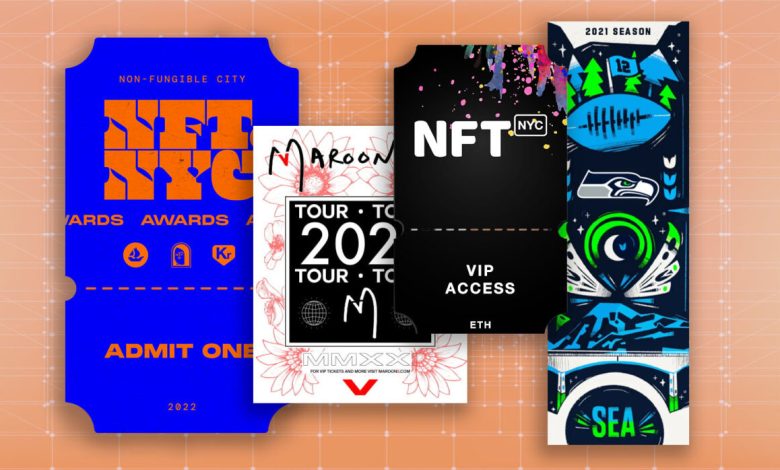How NFTs are Revolutionizing Ticketing

- The rise of NFTs in the ticketing industry
- How NFTs are changing the way we buy and sell tickets
- Exploring the benefits of using NFTs for ticketing
- The future of ticketing: NFTs as the new standard
- Case studies of successful NFT ticketing implementations
- Challenges and opportunities in integrating NFTs into ticketing systems
The rise of NFTs in the ticketing industry
NFTs, or non-fungible tokens, have been making waves in the ticketing industry as a revolutionary way to authenticate and transfer ownership of tickets. These digital assets are unique and cannot be replicated, making them ideal for ticketing purposes. By leveraging blockchain technology, NFTs provide a secure and transparent way to buy, sell, and trade tickets.
One of the key advantages of using NFTs in ticketing is the ability to prevent fraud and counterfeit tickets. Each NFT is tied to a specific event or venue, making it impossible to duplicate or forge. This ensures that ticket holders can trust the authenticity of their tickets and eliminates the risk of being turned away at the door.
Furthermore, NFTs offer ticket holders additional benefits such as exclusive access to VIP experiences, merchandise, or digital content related to the event. This added value enhances the overall ticketing experience and incentivizes fans to purchase NFT tickets over traditional ones.
As more artists, sports teams, and event organizers embrace NFTs in ticketing, we can expect to see a shift towards a more decentralized and secure ticketing ecosystem. This trend not only benefits ticket holders but also opens up new revenue streams for creators and rights holders. The rise of NFTs in the ticketing industry is truly revolutionizing the way we buy and sell tickets.
How NFTs are changing the way we buy and sell tickets
NFTs have completely transformed the way we purchase and sell tickets for events. These digital assets have revolutionized the ticketing industry by providing a secure and transparent way to verify ownership and authenticity. With NFTs, buyers can be confident that they are purchasing legitimate tickets, while sellers can ensure that their tickets are not counterfeit.
One of the key advantages of using NFTs for ticketing is the ability to eliminate fraud and scalping. Since each NFT is unique and stored on a blockchain, it is nearly impossible to duplicate or counterfeit. This means that buyers can trust that the tickets they are purchasing are genuine, leading to a more secure and reliable ticketing experience.
Furthermore, NFTs allow for greater flexibility in ticket sales, as they can be easily transferred or resold on secondary markets. This opens up new opportunities for ticket holders to sell their tickets if they are unable to attend an event, while also providing a way for buyers to purchase tickets from a trusted source.
Overall, NFTs are changing the ticketing landscape by providing a more secure, transparent, and efficient way to buy and sell tickets. As this technology continues to evolve, we can expect to see even more innovations in the ticketing industry that will benefit both buyers and sellers alike.
Exploring the benefits of using NFTs for ticketing
Exploring the advantages of utilizing Non-Fungible Tokens (NFTs) for ticketing can shed light on the numerous benefits this technology brings to the table. NFTs offer a unique way to verify the authenticity of tickets, reducing the risk of fraud and counterfeit tickets. By leveraging blockchain technology, NFTs provide a secure and transparent way to track the ownership and transfer of tickets, ensuring that each ticket is unique and cannot be duplicated.
Furthermore, NFTs allow for greater flexibility and customization in ticketing options. Event organizers can create different tiers of tickets with varying levels of access or perks, all stored securely on the blockchain. This opens up new possibilities for creating exclusive experiences for attendees and increasing revenue streams for organizers.
Another key benefit of using NFTs for ticketing is the potential for increased fan engagement. NFTs can be designed to be collectible and tradable, creating a new market for fans to buy, sell, and trade tickets. This can help build a stronger community around an event or artist, driving excitement and loyalty among fans.
The future of ticketing: NFTs as the new standard
As we look towards the future of ticketing, it is clear that Non-Fungible Tokens (NFTs) are emerging as the new standard in the industry. NFTs offer a unique way to verify the authenticity of tickets, prevent fraud, and provide a seamless transfer of ownership. By leveraging blockchain technology, NFTs can revolutionize the ticketing process, making it more secure and efficient for both event organizers and attendees.
One of the key advantages of using NFTs for ticketing is the ability to create scarcity and exclusivity. Each NFT ticket is one-of-a-kind, with a unique digital signature that cannot be replicated or counterfeited. This not only adds value to the ticket itself but also enhances the overall experience for the ticket holder. Additionally, NFTs can be easily transferred or resold on secondary markets, providing a new level of flexibility for ticket holders.
Furthermore, NFTs can also enable event organizers to establish direct relationships with their audience. By issuing NFT tickets, organizers can collect valuable data on their attendees, such as preferences and purchasing behavior. This data can then be used to personalize future events, improve marketing strategies, and enhance the overall customer experience. In this way, NFTs are not just a ticketing solution but a powerful tool for building customer loyalty and engagement.
Case studies of successful NFT ticketing implementations
Several case studies have demonstrated the successful implementation of NFT ticketing in various events and industries. These examples showcase the potential of NFTs to revolutionize the ticketing industry and provide unique benefits to both event organizers and attendees.
- One notable case study is the use of NFT tickets for a music festival, where attendees were able to purchase and transfer their tickets securely using blockchain technology. This not only reduced the risk of fraud but also allowed for seamless ticket management before, during, and after the event.
- Another successful implementation of NFT ticketing was seen in the sports industry, where fans were able to collect and trade digital tickets for major games and tournaments. This added a new level of excitement and engagement for fans, while also providing teams and organizers with valuable data on ticket ownership and usage.
- Furthermore, NFT ticketing has been adopted by museums and art galleries to offer exclusive access to special exhibitions and events. By minting limited-edition NFT tickets, these institutions have been able to attract a new audience of digital art collectors and enthusiasts.
Overall, these case studies highlight the versatility and potential of NFT ticketing to transform the way tickets are bought, sold, and exchanged across various industries. As more organizations recognize the benefits of blockchain technology in ticketing, we can expect to see even more innovative uses of NFTs in the future.
Challenges and opportunities in integrating NFTs into ticketing systems
Integrating NFTs into ticketing systems presents both challenges and opportunities for the industry. One of the main challenges is the need for widespread adoption and acceptance of NFT technology among consumers. Many people are still unfamiliar with NFTs and may be hesitant to use them for purchasing tickets. Educating the public about the benefits of NFTs in ticketing will be crucial in overcoming this hurdle.
Another challenge is ensuring the security and authenticity of NFT tickets. With traditional paper tickets, there is always a risk of counterfeiting. NFTs can help mitigate this risk by providing a secure and tamper-proof way of verifying ticket ownership. However, there will need to be robust systems in place to prevent fraud and ensure that NFT tickets are legitimate.
On the other hand, integrating NFTs into ticketing systems also presents exciting opportunities for the industry. NFTs can provide a new revenue stream for event organizers through the sale of limited edition digital collectibles. These collectibles can be tied to exclusive perks or experiences, adding value for fans and increasing engagement.
Furthermore, NFTs can help streamline the ticketing process by reducing the need for intermediaries and eliminating the risk of tickets being lost or stolen. This can lead to a more efficient and seamless experience for both event organizers and attendees. Overall, the integration of NFTs into ticketing systems has the potential to revolutionize the way tickets are bought, sold, and experienced.



